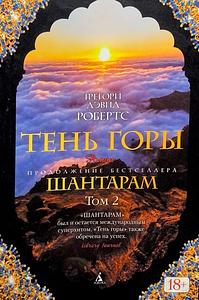Take a photo of a barcode or cover
Shantaram is one of my favorite books. I’ve read it four times. It has effected me. So I’m not quite sure why The Mountain Shadow was so much…less. Same characters, a direct continuation. Maybe some stories are meant to be presented with an ending- and continuing them dilutes the purity of the message. Honestly, I don’t know…
adventurous
challenging
emotional
funny
mysterious
reflective
sad
medium-paced
Plot or Character Driven:
A mix
Strong character development:
Yes
Loveable characters:
Yes
Diverse cast of characters:
Yes
Flaws of characters a main focus:
Yes
adventurous
emotional
inspiring
fast-paced
Plot or Character Driven:
A mix
Strong character development:
Yes
Loveable characters:
Complicated
Diverse cast of characters:
Yes
Flaws of characters a main focus:
Complicated
Estremamente scorrevole, trama super ma con qualche episodio ingiustificato qua e là. Personaggi magistralmente costruiti e stratificati, mi è piaciuto moltissimo ma non è al livello di Shantaram.
I loved Shantaram, but having read it a few years ago, could not remember exactly why I loved it so much. I hoped The Mountain Shadow could recapture that feeling. While entertaining and easy to read, it doesn't match the original in terms of story or detail. It has some flaws and a few slow parts, but overall I liked the book and being back with the cast of characters in Bombay.
Like many others, I loved [b:Shantaram|33600|Shantaram|Gregory David Roberts|https://d.gr-assets.com/books/1333482282s/33600.jpg|3174890], and so I approached this sequel with an equal mix of anticipation and trepidation. Could Gregory David Roberts repeat the magic? The short answer is no. This book isn't nearly as good as Shantaram, and worse, it has the potential to make Shantaram seem worse in retrospect. But having said that, it's not a total disaster either. I read it in a week, and despite its near 900 page length, I never lost interest nor found it hard to stay with.
The Mountain Shadow is set two years after the events of Shantaram. Lin is still living in Bombay and working as a forger for his mentor Khaderbhai's mafia organisation, now run by Sanjay Kumar and known as the Sanjay Corporation. He is living with his girlfriend Lisa (I didn't remember her, but she was in the previous book towards the end), and while he still carries a torch for Karla, he hasn't seen her for two years, since she married Ranjit, an aspiring politician.
In the first 100 pages three key events happen. Lin meets an Irishman by the name of Concannon, he is kidnapped by a rival gang who want information about the Sanjay Corporation and his girlfriend Lisa tells him that she wants to see other people. These three things will set a train of events in motion that drive the remainder of the plot. Apart from brief forays to Sri Lanka and to a spiritual retreat, the action is set entirely in Bombay and many familiar characters will appear, among them Didier, Abdullah, Madame Zhou and Karla. As in the previous book, Bombay is itself a key character in the book, with all its corruption and chaos, millionaires, gangsters, holy men and slum dwellers.
This book is overwritten. It's full of flowery sentences like: "She was a river, not a stone, and every day was another curve in tomorrow's plain" or "Night is Truth wearing a purple dress, and people dance differently there". If it wasn't for the author's postscript telling us that he doesn't endorse drug taking, I would have sworn that he was stoned throughout the writing of this book. So many sentences read like the kind of thing you think is brilliant when you come up with them at 3am, but realise in the cold light of day that they are tripe. Where was the editor in this process, I wondered?
The characters all spend huge amounts of time smoking marijuana and exchanging dialogue that feels like it belongs in a fortune cookie, eg: "A heart filled with greed, pride or hateful feelings is not free" or "It's the things that make us one, that make us worth having" or "Money's a river: some of us go with the current and some of us paddle to the shore". It's these empty platitudes that take the place of character development. I've now read 1700 pages of Lin's adventures and I still couldn't really tell you what Karla is like. Too many characters can be summarised in pithy descriptors like "angry lesbian", "spoiled heiress", "free-spirited Aquarian" or "foul-tempered crusader" - they aren't real or rounded people.
And yet, for all these flaws, there's something likeable in these pages. I can't say with hand on heart that "you should read this", but it's not a write off either and it ends on a genuinely touching and uplifting note.
The Mountain Shadow is set two years after the events of Shantaram. Lin is still living in Bombay and working as a forger for his mentor Khaderbhai's mafia organisation, now run by Sanjay Kumar and known as the Sanjay Corporation. He is living with his girlfriend Lisa (I didn't remember her, but she was in the previous book towards the end), and while he still carries a torch for Karla, he hasn't seen her for two years, since she married Ranjit, an aspiring politician.
In the first 100 pages three key events happen. Lin meets an Irishman by the name of Concannon, he is kidnapped by a rival gang who want information about the Sanjay Corporation and his girlfriend Lisa tells him that she wants to see other people. These three things will set a train of events in motion that drive the remainder of the plot. Apart from brief forays to Sri Lanka and to a spiritual retreat, the action is set entirely in Bombay and many familiar characters will appear, among them Didier, Abdullah, Madame Zhou and Karla. As in the previous book, Bombay is itself a key character in the book, with all its corruption and chaos, millionaires, gangsters, holy men and slum dwellers.
This book is overwritten. It's full of flowery sentences like: "She was a river, not a stone, and every day was another curve in tomorrow's plain" or "Night is Truth wearing a purple dress, and people dance differently there". If it wasn't for the author's postscript telling us that he doesn't endorse drug taking, I would have sworn that he was stoned throughout the writing of this book. So many sentences read like the kind of thing you think is brilliant when you come up with them at 3am, but realise in the cold light of day that they are tripe. Where was the editor in this process, I wondered?
The characters all spend huge amounts of time smoking marijuana and exchanging dialogue that feels like it belongs in a fortune cookie, eg: "A heart filled with greed, pride or hateful feelings is not free" or "It's the things that make us one, that make us worth having" or "Money's a river: some of us go with the current and some of us paddle to the shore". It's these empty platitudes that take the place of character development. I've now read 1700 pages of Lin's adventures and I still couldn't really tell you what Karla is like. Too many characters can be summarised in pithy descriptors like "angry lesbian", "spoiled heiress", "free-spirited Aquarian" or "foul-tempered crusader" - they aren't real or rounded people.
And yet, for all these flaws, there's something likeable in these pages. I can't say with hand on heart that "you should read this", but it's not a write off either and it ends on a genuinely touching and uplifting note.
adventurous
emotional
mysterious
reflective
medium-paced
Plot or Character Driven:
Character
Strong character development:
Yes
Loveable characters:
Yes
Diverse cast of characters:
Yes
Flaws of characters a main focus:
Complicated
DNF at 69%. I shouldn't be surprised that I didn't enjoy this. I Didn't like the first one. But I got so tempted when I saw this in the library to give the author another go and hopefully enjoy this more but I did not.
4.5 stars
I have read Shantaram and I absolutely loved it, but it was so long ago now that I remember little-to-nothing from it, so this sequel could probably be read as a stand-alone novel.
Loved this one too. It's a story about some interesting characters in the underbelly (mostly) of Mumbai. Lives are intertwined and there certainly are an unbelievable number of coincidental meetings and people in the right or wrong places at the right or wrong time. I loved the writing. Chapters were short (although the book is long) and the basic telling is easy reading but every chapter there will be one to two paragraphs of poetic literature. One chapter in particular delves into some interesting philosophy. Normally these sedgeways would bore me, but in this instance I didn't find them overwhelming.
The amazing thing about most of the "good guy" characters is although they are all flawed - and mostly people your parents wouldn't want you hanging out with - you like and sometimes love them. Even the "baddies" have their good moments. And I guess this ability to find the good in the ugly is what makes Lin, the narrator, so likeable.
I do wish I could remember more of Shantaram - especially where the characters who do re-appear are concerned. I'm almost tempted to add it back to my TBR pile: probably time to revisit it :)
I have read Shantaram and I absolutely loved it, but it was so long ago now that I remember little-to-nothing from it, so this sequel could probably be read as a stand-alone novel.
Loved this one too. It's a story about some interesting characters in the underbelly (mostly) of Mumbai. Lives are intertwined and there certainly are an unbelievable number of coincidental meetings and people in the right or wrong places at the right or wrong time. I loved the writing. Chapters were short (although the book is long) and the basic telling is easy reading but every chapter there will be one to two paragraphs of poetic literature. One chapter in particular delves into some interesting philosophy. Normally these sedgeways would bore me, but in this instance I didn't find them overwhelming.
The amazing thing about most of the "good guy" characters is although they are all flawed - and mostly people your parents wouldn't want you hanging out with - you like and sometimes love them. Even the "baddies" have their good moments. And I guess this ability to find the good in the ugly is what makes Lin, the narrator, so likeable.
I do wish I could remember more of Shantaram - especially where the characters who do re-appear are concerned. I'm almost tempted to add it back to my TBR pile: probably time to revisit it :)
Purtroppo non ha la forza del primo, molto sottotono se si pensa a Shantaram




